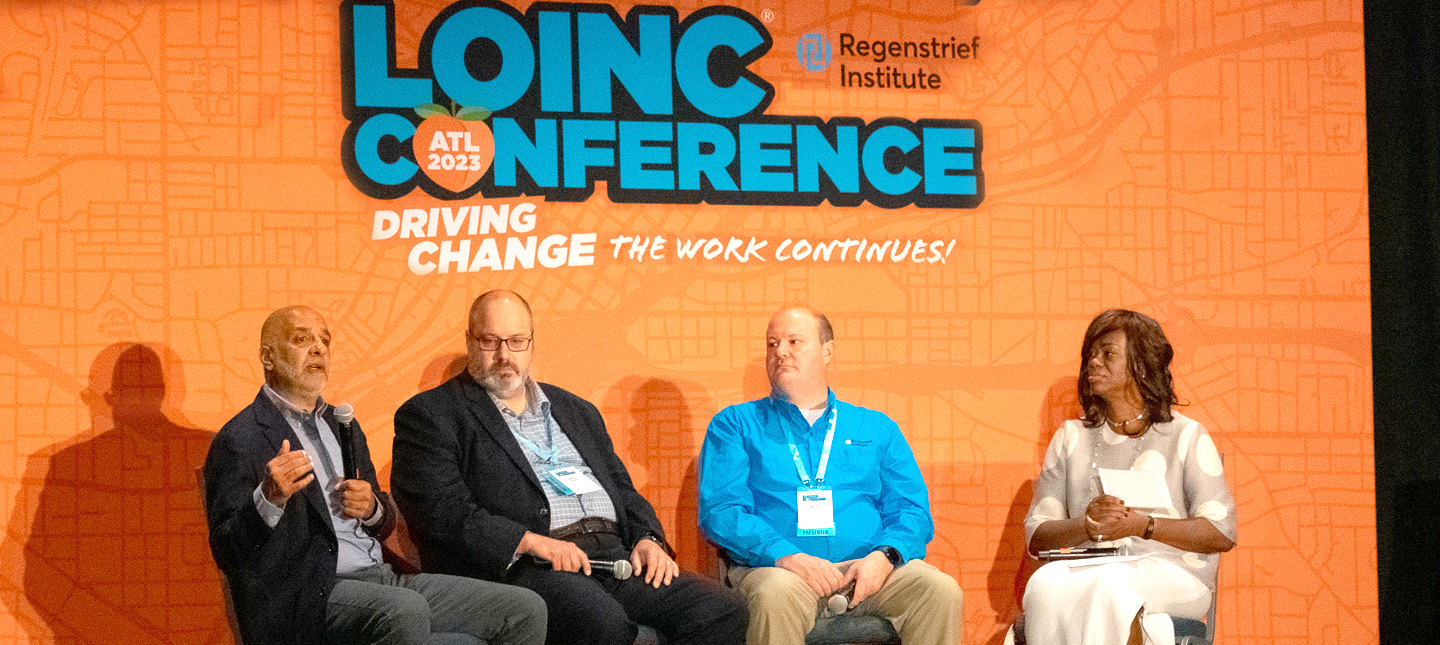Health data standards experts and users from more than 30 countries explored developments in data interoperability and identified paths forward on October 17-20, in Atlanta, Georgia, and online for the 2023 LOINC® Conference.
The annual event featured many luminaries from the niche community and included discussion of the recent release of the LOINC Ontology, a LOINC and SNOMED CT Interoperability Solution.
Featured speakers included:
- Clem McDonald Lecture – Eric Schneider, M.D., MSc, executive vice president of the National Committee for Quality Assurance (NCQA).
- Welcome Plenary – Rachel Patzer, PhD, MPH, president and CEO of Regenstrief Institute.
- Day Two Plenary – Micky Tripathi, PhD, MPP, national coordinator for health information technology at the U.S. Department of Health and Human Services.
- Day Three Plenary – Julia Skapik, M.D., MPH, medical director for informatics at the National Association of Community Health Centers (NACHC).
Additionally, LOINC founder Clem McDonald, M.D., provided a 20-year review of LOINC as an international standard.
“This is always a thought-provoking and engaging conference that demonstrates the importance and value of LOINC,” said Stan Huff, M.D., co-chair of the LOINC Clinical Committee. “I’m grateful for the opportunity to be a part of it all.”
Additional national and international experts who presented at the conference include:
- Sara Armson, M.S., Office of the National Coordinator for Health Information Technology.
- Keith Campbell, M.D., PhD, U.S. Food and Drug Administration.
- Shaun Grannis, M.D., M.S., Regenstrief Institute.
- Patrick McLaughlin, B.S., MLIS, National Library of Medicine.
- Lorraine Wickiser, B.S., R.N., Centers for Medicare and Medicaid Services.
LOINC Award for Distinguished Contributions
Andrea Pitkus, PhD, MLS(ASCP) CM, Ontologist at the University of Wisconsin and Vice Chair of the SHIELD Steering Committee, was the recipient of the annual LOINC Award for Distinguished Contributions. Her leadership and expertise in laboratory data and informatics, including during the recent COVID-19 pandemic, helped further LOINC use in the U.S. laboratory industry.
Additional presenters
- Joe Amlung, senior technical advisor in Center for Biomedical Informatics at Regenstrief Institute.
- Jon Payne, PhD, Regenstrief Institute affiliated scientist.
- Shuning Li, PhD, M.S., assistant research scientist at Indiana University School of Dentistry.
The agenda presented at the conference is available at https://conference.loinc.org. Video recordings and downloadable presentation slides will be available to registrants within two weeks.
LOINC Ontology, a LOINC and SNOMED CT interoperability solution
The landmark collaboration between Regenstrief Institute and SNOMED International provides mapping between the widely used standards for identifying health data. The LOINC Ontology supports providers and users who implement different combinations of SNOMED CT and LOINC in health information systems and allows them to meet clinical and regulatory requirements in a single solution. Linked together in a complementary way, SNOMED CT provides the computable framework and LOINC provides laboratory and pathology content in an understood format to countries that do not currently use LOINC. There is also a freely downloadable technology preview that can be found at https://loincsnomed.org.
About LOINC®
LOINC® was created in 1994 at Regenstrief Institute to facilitate interoperability in healthcare. There was a growing trend to send clinical data electronically between healthcare entities, a practice that has now become ubiquitous. Today, it contains more than 100,000 terms for everything from an albumin level to a zygomatic arch X-ray report. For each concept, LOINC contains many other rich details, such as synonyms, units of measure, and carefully crafted descriptions.
About Regenstrief Institute
Founded in 1969 in Indianapolis, the Regenstrief Institute is a local, national and global leader dedicated to a world where better information empowers people to end disease and realize true health. A key research partner to Indiana University, Regenstrief and its research scientists are responsible for a growing number of major healthcare innovations and studies. Examples range from the development of global health information technology standards that enable the use and interoperability of electronic health records to improving patient-physician communications, to creating models of care that inform clinical practice and improve the lives of patients around the globe.
Sam Regenstrief, a nationally successful entrepreneur from Connersville, Indiana, founded the institute with the goal of making healthcare more efficient and accessible for everyone. His vision continues to guide the institute’s research mission.









